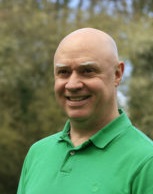“If we believe Jesus is Lord then we have to challenge environmental destruction”
About 90 people will attend the European creation care conference near Nice (France). “Churches have been lacking a vision that puts creation care at the heart of daily discipleship, worship and mission”, says Dave Bookless.
PARIS · 05 SEPTEMBER 2017 · 11:32 CET
A beautiful site in the region of the “Préalps D'Azur” national park in France will host a European conference which aims to offer “solid biblical teaching, up-to-date accurate science, and knowledge of what people can do practically” in the area of creation care.
People coming from more than ten countries will take part in the Lausanne WEA European Regional Creation Care conference in the hills above Nice, on 10-14 September.
Interactive seminars and workshops will seek to share expertise and ideas, and time will also be set aside to meet in national groups “to think through how to make a difference together to care for creation when back home in our local contexts”.
Theologians Chris Wright (UK) and Rosalee Velloso-Ewell (Brazil), scientists Deepa Senapathi (India) and Marcial Felgueiras (Portugal), and other experts in the field such as Ruth Valerio (UK), Andy Atkins (UK), Max Boegli (Switzerland), and Ed Brown (USA) and Dave Bookless (UK) will join others.
Dave Bookless spoke to Evangelical Focus about the vision behind such meetings.

A. We’re not worried about starting small – most movements that have changed the world (and the church) have started tiny but with God’s blessing have had a massive impact: think mustard seeds, yeast, and the impact of a few Reformers 500 years ago! The whole aim of the conference is for people to carry back what they’ve learned and share it, in order to facilitate national evangelical creation care movements.
We now expect 80-90 at the conference and our realistic hope is that this will lead to impacts in perhaps 10-12 European countries from which we have good representation.
Q. What do you hope people attending the conference will bring back home?
A. Our desire is that people attending will leave equipped in terms of solid biblical teaching, up-to-date accurate science, and knowledge of what they can do practically, as well as inspired by each other and by sharing stories of what’s already happening across Europe and beyond in terms of creation care.
Most of all, in a context where most are working in isolated situations as Christians committed to Creation Care, we hope people will be encouraged in their walk with God and in their calling to care for God’s amazing world.
Q. Christians have heard much about climate change, recycling, carbon footprint, etcetera, for a decade or more now. But what do we need to 'hear' or 'see' to really start taking creation care seriously in our church communities?
A. I agree we’ve heard a lot of information, but what’s often been lacking is a vision that puts this at the heart of daily discipleship, worship and mission.
We need to see and share examples of Christians living radically different Jesus-centred lifestyles, and Churches that are doing things differently by putting creation care as a natural part of their worship and ministry, and seeing God’s blessing in terms of the depth and reach of their impact. The Eco Church initiative in the UK is one encouraging example of this, with over 650 churches now on a journey towards integrating creation care into their lives.
Q. “God's World, God's Word, God's Work” is the motto of this year's conference. Why?
A. We’ve been using this three-part theme, originally suggested by the Indian Christian leader Dr Ken Gnanakan, for all of our regional conferences around the world, of which this is the 8th conference and the 5th continent. We’ve found it neatly summarises the challenge we all face in terms of the damage we’re doing to God’s World through greed and excess, the biblical call from God’s Word to see creation as made by and for Christ and to care for it in his name, and the creative responses that many Christians around the world are already making whether in sustainable agriculture, green energy, lifestyle changes, wildlife protection or environmental education.
Q. Several groups are working together (Lausanne, EEA, A Rocha...) in this. Is creation care an example of good evangelical cooperation worldwide? What can other issue-centred initiatives learn from your way of working?
A. Yes, we’ve been told that the LWCCN (Lausanne / World Evangelical Alliance Creation Care Network) is the most active and effective of all the 30 plus Lausanne network groups. We’ve done this on a shoestring with all of us seconded from other organisations: some like A Rocha and Care of Creation giving sacrificial amounts of time and energy, others such as EEA, Tearfund and many mission organisations sharing resources, expertise and contacts. We’ve had to lay down any tendency towards competition, recognising that this is God’s work and that the challenge is urgent.
Q. Is there anything else you would like to share?
A. The global Christian church faces a choice. Either we focus on a ‘spiritual gospel’ that is otherworldly and escapist and sees the massive challenges we face globally as something to escape from, or we take Jesus as his word, and we pray and work for God’s Kingdom ‘on earth as in heaven’. If we believe Jesus is Lord then we have to challenge the consumerism, waste and environmental destruction that we are all part of, because the earth and all its creatures have intrinsic value and belong to Jesus. This is a new reformation, but no less biblical and no less urgent than the one that changed Europe 500 years ago.
Published in: Evangelical Focus - science - “If we believe Jesus is Lord then we have to challenge environmental destruction”
